定语从句的用法(基础讲解)
定语从句的使用方法

定语从句的使用方法1. 定语从句的基本结构- 定语从句通常由关系词引导,例如:that, which, who, whom, whose等。
- 定语从句紧跟在被修饰的名词或代词后面,并且和被修饰的词之间用逗号或者其他标点符号隔开。
2. 关系代词的使用定语从句中常用的关系代词有以下几个:- that: 用于指人或物,做主语或宾语。
that: 用于指人或物,做主语或宾语。
- which: 用于指物,做主语或宾语。
which: 用于指物,做主语或宾语。
- who: 用于指人,做主语。
who: 用于指人,做主语。
- whom: 用于指人,做宾语。
whom: 用于指人,做宾语。
- whose: 用于指人或物,表示所属关系。
whose: 用于指人或物,表示所属关系。
在选择关系代词时,需要根据被修饰的名词来确定使用哪个关系代词。
同时要注意关系代词在从句中的作用和位置。
3. 定语从句的位置定语从句通常放在被修饰的名词或代词之后,作为补充说明。
例如:- The book that is on the table is mine.that is on the table is mine.- The teacher who is standing over there is very kind.who is standing over there is very kind.定语从句也可以放在句子的开头或末尾,但这种情况较少见,需注意语言表达的流畅性和连贯性。
4. 关系词的省略定语从句中的关系词有时可以省略,特别是在非正式的口语表达中。
省略关系词后的句子常常更加简洁。
例如:- The book I bought yesterday is very interesting.I bought yesterday is very interesting.- The dog he was playing with is missing.he was playing with is missing.需要注意的是,省略关系词会增加句子的难度,有时会导致句子理解上的困惑。
初中英语语法——定语从句用法总结归纳
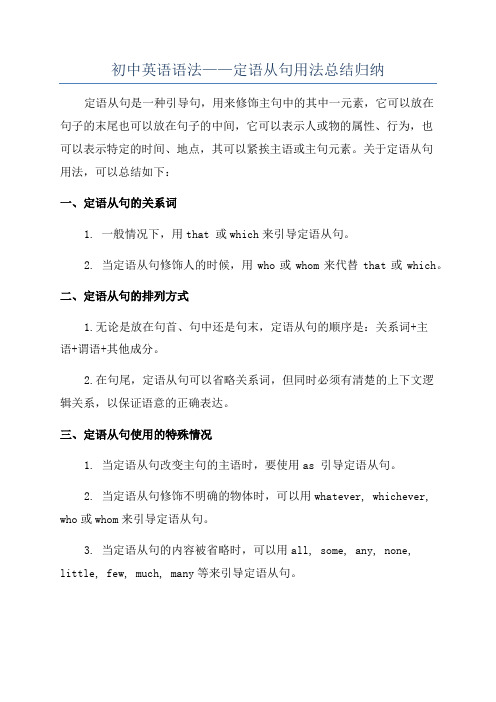
初中英语语法——定语从句用法总结归纳定语从句是一种引导句,用来修饰主句中的其中一元素,它可以放在
句子的末尾也可以放在句子的中间,它可以表示人或物的属性、行为,也
可以表示特定的时间、地点,其可以紧挨主语或主句元素。
关于定语从句
用法,可以总结如下:
一、定语从句的关系词
1. 一般情况下,用that 或which来引导定语从句。
2. 当定语从句修饰人的时候,用who或whom来代替that或which。
二、定语从句的排列方式
1.无论是放在句首、句中还是句末,定语从句的顺序是:关系词+主
语+谓语+其他成分。
2.在句尾,定语从句可以省略关系词,但同时必须有清楚的上下文逻
辑关系,以保证语意的正确表达。
三、定语从句使用的特殊情况
1. 当定语从句改变主句的主语时,要使用as 引导定语从句。
2. 当定语从句修饰不明确的物体时,可以用whatever, whichever, who或whom来引导定语从句。
3. 当定语从句的内容被省略时,可以用all, some, any, none, little, few, much, many等来引导定语从句。
定语从句超详细讲解
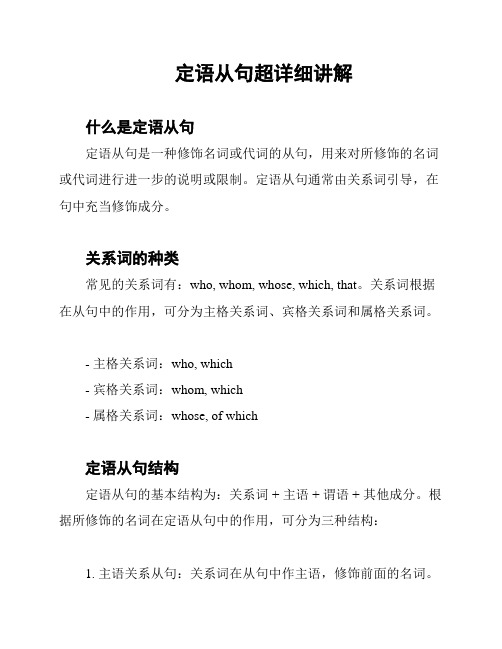
定语从句超详细讲解什么是定语从句定语从句是一种修饰名词或代词的从句,用来对所修饰的名词或代词进行进一步的说明或限制。
定语从句通常由关系词引导,在句中充当修饰成分。
关系词的种类常见的关系词有:who, whom, whose, which, that。
关系词根据在从句中的作用,可分为主格关系词、宾格关系词和属格关系词。
- 主格关系词:who, which- 宾格关系词:whom, which- 属格关系词:whose, of which定语从句结构定语从句的基本结构为:关系词 + 主语 + 谓语 + 其他成分。
根据所修饰的名词在定语从句中的作用,可分为三种结构:1. 主语关系从句:关系词在从句中作主语,修饰前面的名词。
- 例:The book which is on the table is mine.(在桌子上的那本书是我的。
)2. 宾语关系从句:关系词在从句中作宾语,修饰前面的名词。
- 例:She has a brother whom I have never met.(她有个兄弟我从未见过。
)3. 定语关系从句:关系词在从句中作定语,修饰前面的名词。
- 例:I live in a house whose roof is red.(我住在一座房子里,它的屋顶是红色的。
)定语从句的使用注意事项- 关系词指代的是先行词,要保持一致性。
例如,主格关系词引导的从句,先行词也应该是人;宾格关系词引导的从句,先行词也应该是人或物;属格关系词引导的从句,先行词也应该是有所属关系的事物。
- 关系词在从句中可省略,但要根据上下文的需要决定是否省略。
定语从句的练题1. The girl _______ is my sister. (who/whom/which/that)2. The man _______ I talked to is the boss. (who/whom/which/that)3. She is the girl _______ mother works at the hospital.(who/whom/whose/which/that)4. The car _______ is parked outside is mine. (who/which/that)5. The book _______ you borrowed from the library is overdue. (whose/which/that)答案:1. who2. whom3. whose4. that5. which以上就是定语从句的超详细讲解。
定语从句用法及重点解析(完整)

定语从句用法及重点解析一.定语从句及相关术语1.定语从句:修饰一个名词或代词的从句称为定语从句,一般紧跟在它所修饰的先行词后面。
2.关系词:引导定语从句的关联词成为关系词关系词有关系代词和关系副词。
关系代词有that, which, who, whom, whose, as 等;关系副词有where, when, why等。
关系词常有3个作用:1,引导定语从句。
2,代替先行词。
3,在定语从句中担当一个成分。
二. 关系代词和关系副词的功用关系代词和关系副词用来引导定于从句,在先行词和定语从句之间起纽带作用,使二者联系起来。
关系代词和关系副词又在定语从句中充当一个成分。
关系待客做主语,宾语,定语,关系副词可作状语。
1. 作主语:关系代词在定语从句中作主语时,从句的谓语动词的人称和数须和先行词一致。
例如:I don’t like people who talk much but do little.The cars which are produced in Hubei Province sell very well.2. 作宾语:She is the person that I met at the school gate yesterday.The book that my grandmother gave me is called “The Great Escape”.3. 作定语关系代词whose在定语从句中作定语用。
例如:What’s the name of the young man whose sister is a doctor?The girl whose father is a teacher studies very hard.4. 作状语I’l l never forget the day when I first came to Beijing.This is the house where I was born.三. 各个关系代词和关系副词的具体用法1. who 指人,在定语从句中作主语。
(完整版)定语从句语法详解

定语从句语法专题(Attributive Clauses)教案一. 定语从句的概述:1.定语从句:在复合句中,修饰某一名词或代词的从句叫定语从句。
在句中做定语,被修饰的名词或代词,叫做先行词。
从句通常放在先行词之后,由关系词(关系代词或关系副词)引导。
其作用是作定语修饰主句的某个名词性成分,相当于形容词,所以又称为形容词性从句,一般紧跟在它所修饰的先行词后面。
eg She is the girl(who got the first prize.)girl先行词who充当从句主语, 从句做定语修饰girlThis is the boy who broke the window.这就是打破窗子的孩子。
the boy是先行词, who broke the window是限制性定语从句, 明确指出theboy是打破窗子的那个孩子,who 在从句中充当主语That is the house where he lived ten years ago.He is the man who/that lives next door.He is the man who I want to see.先行词关系词定语从句复合句: 是由一个主句和一个或一个以上的从句构成的句子, 复合句中的主句和从句都具有完整的的主语和谓语, 主句是复合句的主体, 可以独立存在, 从句需要有一个连词引导, 是修饰说明主句的, 不能独立存在, 根据在句中的不同作用, 从句可以分为三类: 定语从句, 名词性从句, 状语从句。
二. 引导定语从句的关系词有两大类:1.关系词:引导定语从句的关联词称为关系词,关系词有关系代词和关系副词。
关系代词: that, who, whom, whose, which, as(主, 宾, 定)关系副词: when, where, why.(状语)2.关系词的作用:(1)引导定语从句, 在先行词和定语从句之间起连接作用;(2)代替先行词在句中充当成分。
定语从句知识点总结简单

定语从句知识点总结简单一、定语从句的概念定语从句是指修饰名词或代词的从句,用来限定或描述这个名词或代词的性质、特征等。
定语从句通常放在被修饰的名词或代词之后,用以补充说明名词或代词所指的具体内容。
二、定语从句的结构定语从句的结构包括先行词、关系代词或关系副词以及从句三个部分。
1. 先行词:即被定语从句修饰的名词或代词,通常在定语从句的前面。
2. 关系代词:在定语从句中起连接作用的代词,包括who, whom, whose, which, that等。
3. 关系副词:在定语从句中起连接作用的副词,包括where, when, why等。
三、关系代词和关系副词的用法1. who/whom/whose:关系代词,用来引导修饰人的定语从句。
例如:The girl who is standing there is my sister.The man whose car was stolen has reported to the police.2. which/that:关系代词,用来引导修饰物的定语从句,which一般只用于非限制性定语从句。
例如:The book which is on the table is mine.The pen that I lost last night is found.3. where:关系副词,用来引导修饰地点的定语从句。
例如:This is the school where I study.4. when:关系副词,用来引导修饰时间的定语从句。
例如:That was the day when we met for the first time.5. why:关系副词,用来引导修饰原因的定语从句。
例如:I don't understand the reason why he left so suddenly.以上是关系代词和关系副词的基本用法,需要根据具体的语境来选择适当的关联词。
定语从句用法

定语从句用法定语从句是英语中常用的修饰句子成分的一种从句。
它通过引导词来连接主句和从句,一般用来修饰名词或代词,起到进一步说明、限定或描述的作用。
定语从句在英语中非常常见,并且灵活运用它可以提高语言表达的准确性和流畅性。
本文将介绍定语从句的基本用法以及注意事项,并通过例句加以说明。
一、定语从句的基本结构定语从句的基本结构是:关系代词/关系副词 + 句子。
关系代词有who, whom, whose, which, that等;关系副词有where, when, why等。
关系代词在定语从句中充当主语、宾语或所有格,关系副词在定语从句中充当地点状语、时间状语或原因状语。
例句1:I have a friend who teaches English in a university.例句2:The book that you lent me is very interesting.例句3:This is the reason why he failed the exam.二、定语从句的引导词选择1. 关系代词的选择(1)指人:who, whom, whose, that(2)指物:which, that(3)指人或物:who, whom, whose, which, that2. 关系副词的选择(1)地点:where(2)时间:when(3)原因:why三、定语从句的位置定语从句通常紧跟被修饰的名词或代词,但也可以放在其他位置,以使句子更连贯流畅。
例句4:The boy who is wearing a red shirt is my brother.例句5:The movie, which was directed by Steven Spielberg, won several awards.四、定语从句的省略1. 关系代词的省略当关系代词在定语从句中作宾语且在从句中不作成分时,可以省略。
例句6:Is there anyone (that/who) wants to join the party?2. be动词的省略当主句和从句中有相同的be动词时,从句中的be动词可以省略。
定语从句讲解(完整版)
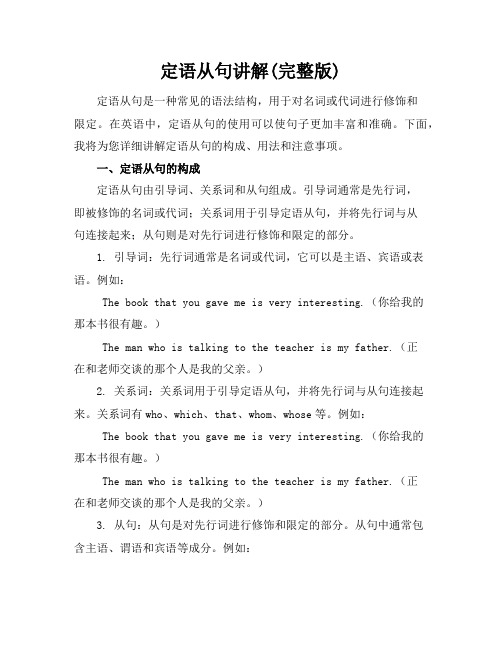
定语从句讲解(完整版)定语从句是一种常见的语法结构,用于对名词或代词进行修饰和限定。
在英语中,定语从句的使用可以使句子更加丰富和准确。
下面,我将为您详细讲解定语从句的构成、用法和注意事项。
一、定语从句的构成定语从句由引导词、关系词和从句组成。
引导词通常是先行词,即被修饰的名词或代词;关系词用于引导定语从句,并将先行词与从句连接起来;从句则是对先行词进行修饰和限定的部分。
1. 引导词:先行词通常是名词或代词,它可以是主语、宾语或表语。
例如:The book that you gave me is very interesting.(你给我的那本书很有趣。
)The man who is talking to the teacher is my father.(正在和老师交谈的那个人是我的父亲。
)2. 关系词:关系词用于引导定语从句,并将先行词与从句连接起来。
关系词有who、which、that、whom、whose等。
例如: The book that you gave me is very interesting.(你给我的那本书很有趣。
)The man who is talking to the teacher is my father.(正在和老师交谈的那个人是我的父亲。
)3. 从句:从句是对先行词进行修饰和限定的部分。
从句中通常包含主语、谓语和宾语等成分。
例如:那本书很有趣。
)The man who is talking to the teacher is my father.(正在和老师交谈的那个人是我的父亲。
)二、定语从句的用法1. 限定性定语从句:限定性定语从句对先行词起到限定作用,即只有满足定语从句条件的名词或代词才是先行词的准确含义。
限定性定语从句通常紧跟在先行词之后,且不能用逗号与主句隔开。
例如: The book that you gave me is very interesting.(你给我的那本书很有趣。
定语从句的用法归纳

定语从句的用法归纳定语从句的用法归纳如下:定语从句的定义:用一个完整的句子做定语去修饰限定前面的名词或者代词,它属于后置定语。
1. 引导词:引导定语从句的词包括关系代词和关系副词。
关系代词有:who(人),whom(人,宾格),whose(所有格),which(物),that (人或物)。
关系副词有:when(时间),where(地点),why(原因)。
2. 关系代词的选择:根据被修饰的名词是人还是物、在定语从句中充当什么成分来选择关系代词。
例如,修饰人的定语从句一般用关系代词who或that;修饰物的定语从句一般用关系代词which或that。
3. 关系代词的省略:当关系代词在定语从句中作宾语时,且在从句中不作主语时,可以省略。
例如:I met the girl (who/whom) you mentioned yesterday.4. 关系副词的使用:关系副词引导的定语从句可以用来修饰时间、地点和原因。
例如:I still remember the day when we first met.5. 介词+关系代词:在定语从句中,当介词与关系代词一起使用时,关系代词要放在介词后面。
例如:That's the book about which I told you.6. 非限制性定语从句:非限制性定语从句用来对名词进行附加说明,不对其进行限制。
它通常用逗号与主句隔开。
例如:My brother, who lives in New York, is a doctor.7. 定语从句的位置:定语从句通常紧跟在被修饰的名词或代词之后。
但也可以把定语从句放在句末,此时需要使用逗号隔开。
例如:I bought a car, which is red.。
英语定语从句语法详解
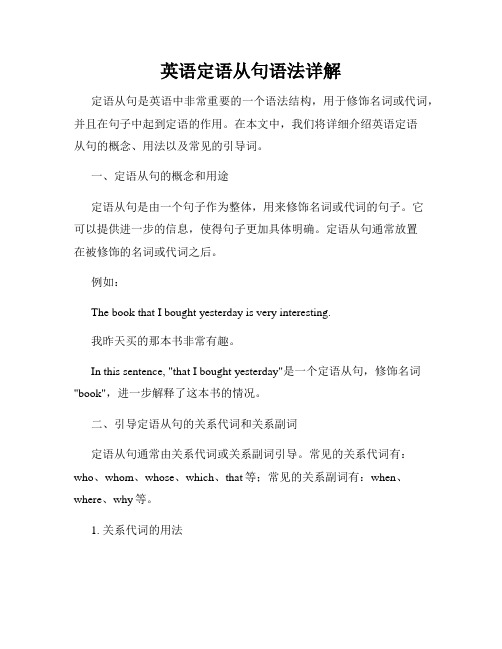
英语定语从句语法详解定语从句是英语中非常重要的一个语法结构,用于修饰名词或代词,并且在句子中起到定语的作用。
在本文中,我们将详细介绍英语定语从句的概念、用法以及常见的引导词。
一、定语从句的概念和用途定语从句是由一个句子作为整体,用来修饰名词或代词的句子。
它可以提供进一步的信息,使得句子更加具体明确。
定语从句通常放置在被修饰的名词或代词之后。
例如:The book that I bought yesterday is very interesting.我昨天买的那本书非常有趣。
In this sentence, "that I bought yesterday"是一个定语从句,修饰名词"book",进一步解释了这本书的情况。
二、引导定语从句的关系代词和关系副词定语从句通常由关系代词或关系副词引导。
常见的关系代词有:who、whom、whose、which、that等;常见的关系副词有:when、where、why等。
1. 关系代词的用法a. who/whom/whose:用于人。
who用作主语或宾语,whom用作宾语,而whose表示所有关系。
例如:The man who is standing over there is my father.那个站在那里的人是我爸爸。
The boy whom I met yesterday is my classmate.我昨天遇到的那个男孩是我的同学。
This is the house whose roof is red.这是一座屋顶是红色的房子。
b. which/that:用于物。
which用作主语或宾语,that可用作主语、宾语或定语。
例如:The car which/that is parked in front of the house is mine.停在房子前面的那辆车是我的。
The book which/that I borrowed from the library is very interesting.我从图书馆借来的那本书非常有趣。
高考英语 定语从句知识点归纳讲解(课件)

试卷讲评课件
▲ as通常以the same … as或such … as的形式引导定语从句,as在定 语从句中作主语、宾语或表语等。 as和which引导非限制性定语从句中都能指代整句内容,which译为“这”, as 译为“正如”。但定语从句位于句首时只能用as。As we all know,…/As is known to all,…(正如大家所知道….)
二、定语从句的关系词用法
试卷讲评课件
(一)关系代词:who、whom、which、that、whose、as
关系代词 who whom whose which that as
先行词 人 人
人/物 物
人/物 人/物
在从句中充当的成分 主语、宾语、表语
宾语 定语 主语、宾语 主语、宾语、表语 主语、宾语、表语
三、非限制性定语从句
试卷讲评课件
非限定性定语从句,从句式上看,有逗号隔开。它既可以修饰先行词, 也可修饰整个句子。它对其先行词没有限定、修饰的作用,只起补充、 说明的作用。 1.非限制性定语从句通常不能用that 2. 非限制性定语从句不能用why引导,要用for which代替why。例如: I had told them the reason,for which I didn't attend the meeting. 3. 非限制性定语从句置于句首时,不能用which引导。关系代词as引导 非限制性定语从句位置比较灵活,可以放主句前,也可以放主句后。
Tranquil/ˈtræŋkwəl/
试卷讲评课件
Li Shangyin(李商隐) 1.Li Shangyin was a Chinese poet of the late Tang Dynasty and born in Henei. 2.Li Shangyin was a typical late Tang poet. His works are sensuous, dense and allusive. 3.His most famous and cryptic poem is called Jin Se. sensuous/ˈsenʃuəs/ , dense/dens/ and allusive/əˈluːʒən/ .敏感、晦涩、含 沙射影。 Shangguan Wan'er(上官婉儿) 1. Shangguan Wan'er was a talented woman in Tang dynasty.
定语从句的用法归纳总结

定语从句的用法归纳总结
定语从句是一种修饰前面名词或代词的从句,通常用来进一步说明和限定它所修饰的名词或代词。
以下是定语从句的用法归纳总结:
1. 定语从句通常由关系代词或关系副词引导,常见的关系代词有:that, which, who, whom, whose等;常见的关系副词有:where, when, why等。
2. 如果关系代词在定语从句中作主语,其引导词将根据引导的句子在人称、数方面发生变化,例如:who, whom, whose用来修饰人,which 用来修饰物,that可以修饰人或物。
3.定语从句通常紧跟在被修饰的名词或代词之后,注意修饰的是前面整个名词短语或代词短语,而不仅仅是名词本身。
4.定语从句可以位于句首、句中或句尾,但要注意与先行词的位置关系。
5.关系代词在定语从句中既作引导词,也充当句子成分。
如果在定语从句中作宾语,则可以省略。
6.定语从句中的动词时态主要根据句子的时态决定,一般使用一般时态。
但如果前面有表示过去的时间状语,通常使用过去时。
7. 引导定语从句的关系副词中,where用来修饰地点,在定语从句中作地点状语;when用来修饰时间,在定语从句中作时间状语;why用来修饰原因,在定语从句中作原因状语。
8.记住定语从句的主要功能是限定和修饰名词或代词,使句意更加明确,提供更多的信息。
定语从句的用法归纳
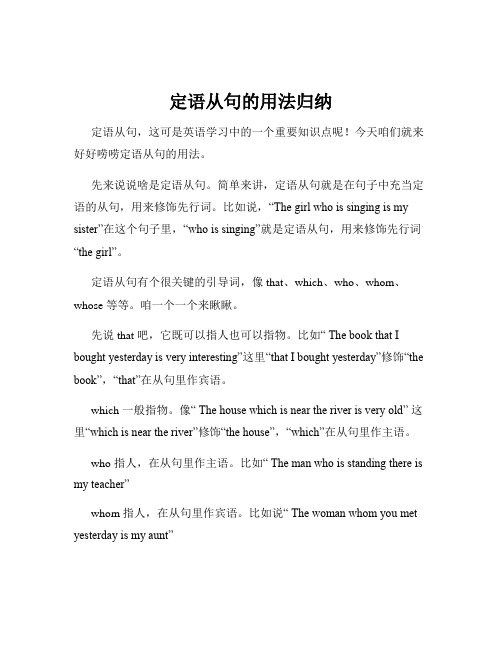
定语从句的用法归纳定语从句,这可是英语学习中的一个重要知识点呢!今天咱们就来好好唠唠定语从句的用法。
先来说说啥是定语从句。
简单来讲,定语从句就是在句子中充当定语的从句,用来修饰先行词。
比如说,“The girl who is singing is my sister”在这个句子里,“who is singing”就是定语从句,用来修饰先行词“the girl”。
定语从句有个很关键的引导词,像 that、which、who、whom、whose 等等。
咱一个一个来瞅瞅。
先说 that 吧,它既可以指人也可以指物。
比如“ The book that I bought yesterday is very interesting”这里“that I bought yesterday”修饰“the book”,“that”在从句里作宾语。
which 一般指物。
像“ The house which is near the river is very old” 这里“which is near the river”修饰“the house”,“which”在从句里作主语。
who 指人,在从句里作主语。
比如“ The man who is standing there is my teacher”whom 指人,在从句里作宾语。
比如说“ The woman whom you met yesterday is my aunt”whose 表示“……的”,既可以指人也可以指物。
像“ The boy whose father is a doctor studies very hard” 还有“ The room whose window is broken needs repairing”再来讲讲定语从句中的一些要注意的点。
当先行词被一些词修饰的时候,像 all、any、few、little、much、some、no 等等,这时候引导词得用 that 不能用 which 。
高中英语知识点归纳定语从句的用法
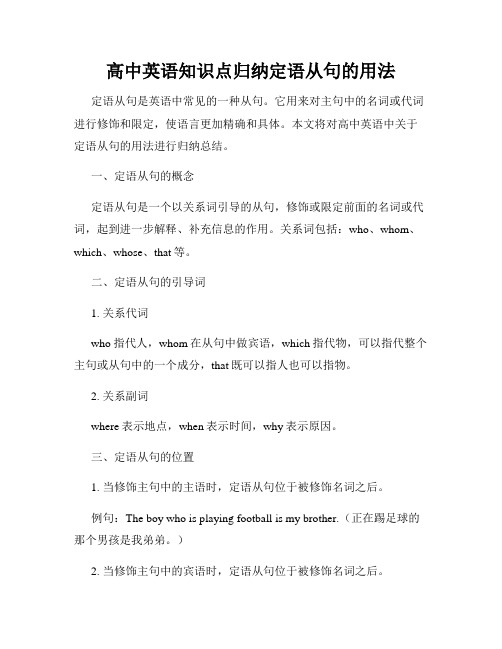
高中英语知识点归纳定语从句的用法定语从句是英语中常见的一种从句。
它用来对主句中的名词或代词进行修饰和限定,使语言更加精确和具体。
本文将对高中英语中关于定语从句的用法进行归纳总结。
一、定语从句的概念定语从句是一个以关系词引导的从句,修饰或限定前面的名词或代词,起到进一步解释、补充信息的作用。
关系词包括:who、whom、which、whose、that等。
二、定语从句的引导词1. 关系代词who指代人,whom在从句中做宾语,which指代物,可以指代整个主句或从句中的一个成分,that既可以指人也可以指物。
2. 关系副词where表示地点,when表示时间,why表示原因。
三、定语从句的位置1. 当修饰主句中的主语时,定语从句位于被修饰名词之后。
例句:The boy who is playing football is my brother.(正在踢足球的那个男孩是我弟弟。
)2. 当修饰主句中的宾语时,定语从句位于被修饰名词之后。
例句:I bought a book which was written by J.K. Rowling.(我买了一本J.K.罗琳写的书。
)3. 当修饰主句中的宾语时,定语从句位于被修饰名词之前。
例句:I saw the girl whom I met yesterday.(我看到了昨天遇到的那个女孩。
)四、限制性定语从句与非限制性定语从句1. 限制性定语从句用来对名词进行修饰和限定,如果去掉不影响主句的完整性。
被从句修饰的名词不能省略。
例句:The book that I bought yesterday is very interesting.(昨天我买的那本书非常有趣。
)2. 非限制性定语从句用来对名词进行陈述和补充说明,去掉会影响句子的意思和完整性。
被从句修饰的名词可以省略。
例句:Tom, who is a doctor, works in a hospital.(汤姆是个医生,在一家医院工作。
定语从句用法(含例句及解析)
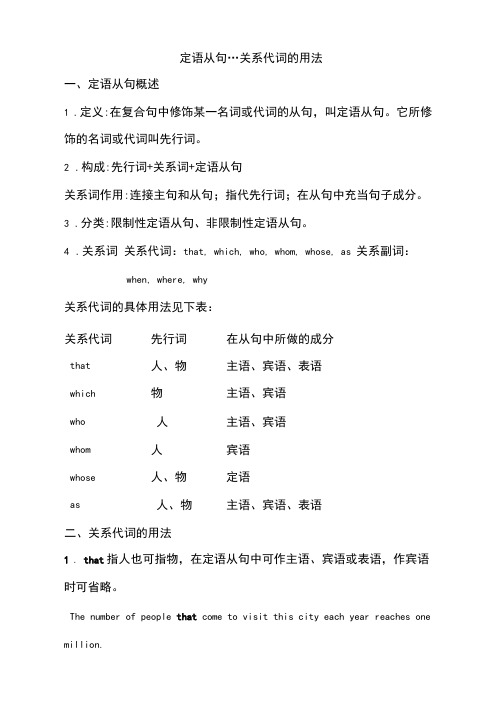
定语从句…关系代词的用法一、定语从句概述1.定义:在复合句中修饰某一名词或代词的从句,叫定语从句。
它所修饰的名词或代词叫先行词。
2.构成:先行词+关系词+定语从句关系词作用:连接主句和从句;指代先行词;在从句中充当句子成分。
3.分类:限制性定语从句、非限制性定语从句。
4.关系词关系代词:that, which, who, whom, whose, as 关系副词:when, where, why关系代词的具体用法见下表:关系代词先行词在从句中所做的成分that 人、物主语、宾语、表语which 物主语、宾语who 人主语、宾语whom 人宾语whose 人、物定语as 人、物主语、宾语、表语二、关系代词的用法1. that指人也可指物,在定语从句中可作主语、宾语或表语,作宾语时可省略。
The number of people that come to visit this city each year reaches one million.每年来游览这座城市的人的数量达到了100万。
(指人,作主语)This is the suitcase (that)she is looking for.这就是他在找的那个手提箱。
(指物,作宾语)2. which指物,在定语从句中可作主语或宾语,作宾语时可省略。
They ignored the details which might account for the accident.他们忽略了那些或许可以解释事故发生原因的细节。
(作主语)3.who指人,在定语从句中可作主语或宾语,作宾语时可省略。
We are concerned about people who have suffered a lot in the earthquake. 我们为在地震中遭受重创的人们担心。
(作主语)Danny was the man (who)we rescued from the ruins.丹尼正是我们从废墟中救出来的那个人。
定语从句的用法

定语从句的用法定语从句是英语中一种常见的语法结构,用来修饰名词或代词。
它通过引导词(关系代词或关系副词)与主句相连,起到限定和具体化名词或代词的作用。
在本文中,我们将深入探讨定语从句的使用方法,以及一些值得注意的细节。
一、引导词的选择1. 关系代词:关系代词主要有“that”、“which”、“who”、“whom”、“whose”等。
选择哪个关系代词要根据所修饰的先行词和在从句中所起的作用来决定。
一般来说,关系代词“that”可以修饰人或物,而“which”只能修饰物;关系代词“who”和“whom”只能修饰人,分别作主语和宾语;关系代词“whose”用来指代所修饰名词的所有格。
2. 关系副词:关系副词主要有“where”、“when”、“why”等。
它们用来引导定语从句,修饰在主句中的名词或代词,并指出时间、地点或原因。
关系副词的使用具有一定的局限性,需要根据具体的情况进行选择。
二、定语从句的位置定语从句通常紧跟在被修饰的名词或代词后面。
例如:1. The book that I borrowed from the library is very interesting.(我从图书馆借来的那本书非常有趣。
)2. The person whom we met yesterday is my uncle.(我们昨天见到的那个人是我的叔叔。
)但是,当被修饰的名词或代词是主句的主语时,定语从句需要放在主句之后。
例如:1. My brother, who is a doctor, lives in London.(我的兄弟是一名医生,他住在伦敦。
)2. The movie, which was directed by Steven Spielberg, won several awards.(这部电影是由史蒂文·斯皮尔伯格导演的,它赢得了几个奖项。
)三、定语从句的省略当定语从句中缺少主语或宾语时,可以通过省略关系代词或关系副词来简化句子。
定语从句讲解

定语从句一.课文原句I like music that I can dance to .我喜欢可以随之跳舞的音乐。
Rose likes music that’s quiet and gentle. 玫瑰喜欢轻柔的音乐。
I prefer singers who write their own lyrics . 我喜欢自己写歌词的歌手。
以上三个句子都是含有定语从句的复合句。
第一,二句均是由that 引导的定语从句,修饰先行词都是music,第三句是由who 引导的定语从句,修饰先行词singers.二.概念及构成在复合句中,修饰名词或代词的从句叫做定语从句。
被定语从句修饰的名词或代词叫做先行词。
定语从句放在先行词的后面,由关系代词或关系副词引导。
其结构为:先行词+关系代词或关系副词+从句。
引导定语从句的关系代词有that , which , who , whom , whose等,关系副词有where , when , why 等。
三.用法点拨1.关系代词在定语从句中的用法关系代词that , which , who , whom , whose 放在先行词和定语从句之间起连接作用,同时又代替先行词在从句中充当某一成分,关系代词作从句的宾语时通常可以省略,但作从句主语时不能省略。
(1)that在从句中可以作主语或宾语,可以指人也可以指物This is the PE teacher that plays soccer best. (作主语)这就是踢足球最棒的那位体育老师。
He isn’t the person that I talked to just now . (作宾语)他不是刚才和我说话的那个人。
I like the cat that has four white paws . (作主语)我喜欢那只长着四只白色爪子的猫。
This is the cat that I like best . (作宾语)这就是我最喜欢的那只猫。
定语从句用法讲解(基础版)

一. 定语从句的基本定义放在名词或代词后面,由关系代词或关系副词引导的修饰该名词或代词的从句叫定语从句。
被修饰的词叫先行词。
The boy who is reading is Tom.Hospital is a place where a doctor works.二. 关系词的分类1、关系代词关系代词在定语从句中作主语、宾语、表语和定语,常用的关系代词有:that, which, who, whom, whose 2. 关系副词关系副词在定语从句中作状语,常用的关系副词有:when, where, why三. 关系代词的基本用法和注意点①who指人,在定语从句中作主语或宾语。
作宾语时,可省略。
The man (who) I talked with is our teacher.A person who steals things is called a thief.②whom指人,在定语从句中作宾语,可省略。
The man (whom) I nodded to is Mr. Li.③which 指物,在定语从句中作主语或宾语。
作宾语时,可省略。
These are the trees which were planted last year.This recorder (which)he is using is made in Japan.④that 指人或物,在定语从句中作主语或宾语。
作宾语时,可省略。
A plane is a machine that can fly.He is the man (that) I told you about.⑤whose指人或物, 在定语从句中作定语。
不可省略。
This is the little girl whose parents were killed in the great earthquake.We live in a house whose windows face south..2、关系代词的用法注意点(1) that和which都可以指物,但以下5种情况只能用that 不能用which。
定语从句知识点归纳总结

一、定语从句的概念在复合句中,修饰某一名词或代词的从句叫做定语从句。
被定语从句修饰的名词或代词叫先行词,定语从句一般放在先行词的后面。
二、定语从句的关系词引导定语从句的关系词有关系代词和关系副词。
关系代词有 that, which, who, whom, whose 等;关系副词有 when, where, why 等。
1. 关系代词的用法that 既可以指人也可以指物,在定语从句中作主语、宾语或表语。
which 指物,在定语从句中作主语、宾语。
who 指人,在定语从句中作主语、宾语。
whom 指人,在定语从句中作宾语。
whose 既可以指人也可以指物,在定语从句中作定语。
2. 关系副词的用法when 指时间,在定语从句中作时间状语。
where 指地点,在定语从句中作地点状语。
why 指原因,在定语从句中作原因状语。
三、定语从句的分类1. 限制性定语从句限制性定语从句对先行词起限制、修饰的作用,关系紧密,一般不可缺少,否则主句的意思就不完整。
2. 非限制性定语从句非限制性定语从句对先行词起补充说明的作用,关系较松散,即使去掉,主句的意思仍然完整。
非限制性定语从句与主句之间通常用逗号隔开。
四、定语从句中关系词的选择1. 先行词是人时,关系词用 who/whom/that当先行词在从句中作主语时,用 who/that。
当先行词在从句中作宾语时,用 whom/who/that(在口语或非正式文体中常用 who 代替 whom)。
2. 先行词是物时,关系词用 which/that当先行词在从句中作主语或宾语时,用 which/that。
3. 先行词是人和物时,关系词用 that4. 先行词是时间名词时,关系词用 when当先行词在从句中作时间状语时,用 when。
5. 先行词是地点名词时,关系词用 where当先行词在从句中作地点状语时,用 where。
6. 先行词是 reason 时,关系词用 why当先行词在从句中作原因状语时,用 why。
- 1、下载文档前请自行甄别文档内容的完整性,平台不提供额外的编辑、内容补充、找答案等附加服务。
- 2、"仅部分预览"的文档,不可在线预览部分如存在完整性等问题,可反馈申请退款(可完整预览的文档不适用该条件!)。
- 3、如文档侵犯您的权益,请联系客服反馈,我们会尽快为您处理(人工客服工作时间:9:00-18:30)。
定语从句的用法撰稿:郭素清责编:白雪雁【真题再现】1. —What do you think of the school uniforms?”—Very good. I like clothes ______ make me feel comfortable.”【2012贵州贵阳】A. thatB. whatC. who2. There will be a flower show in the park _______ we visited last week. 【2012广东】A. whoB. whenC. whatD. which3. —Now many people smoke and get ill. 【2012广西玉林】—So we should do something ______ can help stop smoking.A. whatB. whoC. /D. that4. I still remember the time _______ we spent together at XiSai mountain last year. 【2012 湖北黄石】A. whenB. whatC. whoD. which5. One of the most delicious drinks _________ I like is orange juice. 【2012湖北十堰】A. whichB. thatC. whoseD. whom6. —There are so many girls over there. Which one is your sister? 【2012湖北随州】— The one ______hat is yellow.A. whoB. whoseC. thatD. which7. We all like the story about the teacher _______ happened in our school last week. 【2012湖北咸宁】A. whichB. whoC. whomD. what8. The English-Chinese dictionary my father bought for me many years ago is still of great value. 【2012江苏南京】A. whoseB. whenC. whoD. that【答案与解析】1. A。
考查定语从句引导词的用法。
定语从句的先行词clothes是“物”,所以定语从句的引导词用which或that。
根据句意“你觉得校服怎么样呀?很好,我喜欢穿舒服的衣服”。
2. D。
考查定语从句引导词的用法。
由于先行词是物,所以引导词用which或that,而且引导词在定语从句中作宾语。
3.D。
定语从句的先行词是不定代词something,所以定语从句的引导词用that。
4. D。
由于定语从句中的先行词是time,且引导词在从句中作宾语,所以定语从句的引导词用that 或which,故选D。
5. B。
由于定语从句的先行词drinks被形容词最高级修饰,所以引导词只能用that,而不用which。
6. B。
考查定语从句的引导词,根据句意可知引导词在定语从句中作定语,修饰hat,只能选whose。
7. A。
本题需要准确找出定语从句的先行词the story,是指物而不是指人,所以定语从句的引导词用which而不用who。
8.D。
考查定语从句的引导词。
由于先行词是物,且引导词在定语从句中作宾语,所以用that。
【用法讲解】考试要求:定语从句一般不是中考重点考查内容,大部分地区的中考只要求理解定语从句,但是部分地区也对定语从句的引导词及定语从句中的主谓一致进行了考查,但是理解定语从句的结构对于准确理解句子的意思相当重要。
1. 定语从句的功用和结构在复合句中,修饰某一名词或代词的从句叫做定语从句。
被定语从句修饰的词叫做先行词。
定语从句必须放在先行词之后。
引导定语从句的关联词有关系代词和关系副词。
例如:This is the present that he gave me for my birthday.这是他为我生日送的礼物。
Do you know everybody who came to the party?你认识来宴会的每一位吗?This is the place where Chairman Mao once lived.这是毛主席曾经居住过的地方。
2. 各个关系代词和关系副词的具体用法(1)who 指人,在定语从句中作主语或宾语。
例如:The person who broke the window must pay for it.打碎玻璃的人必须赔偿。
The boy who is wearing the black jacket is very clever.穿黑色夹克的男孩非常聪明。
(2)whom指人,在定语从句中作宾语。
例如:Do you know the young man (whom) we met at the gate?你认识我们在门口遇到的那位男士吗?Mr. Lee (whom) you want to see has come.你要见的李先生已经来了。
(3)whose 指人,在定语从句中作定语。
例如:The girl whose mother is ill is staying at home today.她妈妈病的那个女孩今天呆在家里。
I know the boy whose father is a professor.我认识他父亲是教授的那个男孩。
(4)which指物,在定语从中作主语或宾语。
例如:A dictionary is a book which gives the meaning of words.字典是一本解释单词意思的书。
Here is the book (which) the teacher mentioned yesterday.这是老师昨天提到的那本书。
(5)that多指物,有时也指人,在定语从句中作主语或宾语。
例如:I’ve read the newspaper that / which carries the important news.我已经读了那份承载重要新闻的报纸。
Who is the person that is reading the newspaper over there?正在那儿读报纸的人是谁?(6)when 指时间,在定语从句中作状语。
例如:I’ll never forget the time when we worked on the farm.我从不会忘记我们工作在农场的时间。
He arrived in Beijing on the day when I left.就在我离开那天他到得北京。
(7)where 指地点,在定语从句中作状语。
例如:This is the house where we lived last year.这是我们去年居住的那个房子。
The factory where his father works is in the east of the city.父亲工作的那个工厂在城市的东边。
3. 关系代词和关系副词的功用关系代词和关系副词用来引导定语从句,在先行词和定语从句之间起纽带作用,使二者联系起来。
关系代词和关系副词又在定语从句中充当一个成分,关系代词可作主语、宾语或定语,关系副词可作状语。
(1)作主语:关系代词在定语从句中作主语时,从句的谓语动词的人称和数必须和先行词一致。
例如:I don’t like people who talk much but do little.我不喜欢说得多而做得少的人。
The cars which are produced in Hubei Province sell very well.湖北生产的汽车销售得很好。
(2)作宾语:例如:She is the person that I met at the school gate yesterday.她是我昨天在校门口遇见的那个人。
The book that my grandmother gave me is called The Great Escape.奶奶给我的那本书叫《大逃亡》。
(3)作定语:关系代词whose在定语从句中作定语用。
例如:What’s the name of the young man whose sister is a doctor?他的妹妹是医生的那个年轻男子叫什么名字?The girl whose father is a teacher studies very hard.她的父亲是一位老师的那个女孩学习很努力。
(4)作状语I’ll never forget the day when I first came to Beijing.我将从不会忘记我第一次来北京的那天。
This is the house where I was born.这是我出生的那个房子。
4. 具体使用时注意下列问题:只能使用that,不用which 的情况:(1) 先行词是all, few, little, nothing, everything, anything 等不定代词时。
例如:All that he said is true. 所有他说的都是真的。
(2) 如果先行词被形容词最高级以及first, last, any, few, much, no, some, only, very等词修饰,关系代词常用that,不用which。
例如:This is the only book that the old woman is interested in.这是仅有的一本老妇人感兴趣的书。
(3) 先行词是序数词或被序数词修饰的词。
例如:It was the second house that I bought.这是我买的第二个房子。
(4) 先行词是形容词最高级或被形容词最高级修饰的词。
例如:This is the best book (that) I have read this year.这是我今年读过的最好的书。
(5) 先行词既包括人又包括物时。
例如:He talked about the people and the things that he remembered.他谈论他记起得的人和事。
只能用which,不能用that 的情况:(1) 在非限制性定语从句中。
例如:I will take this one, which was exactly what we wanted.我想买这个,它确实是我想要的。
